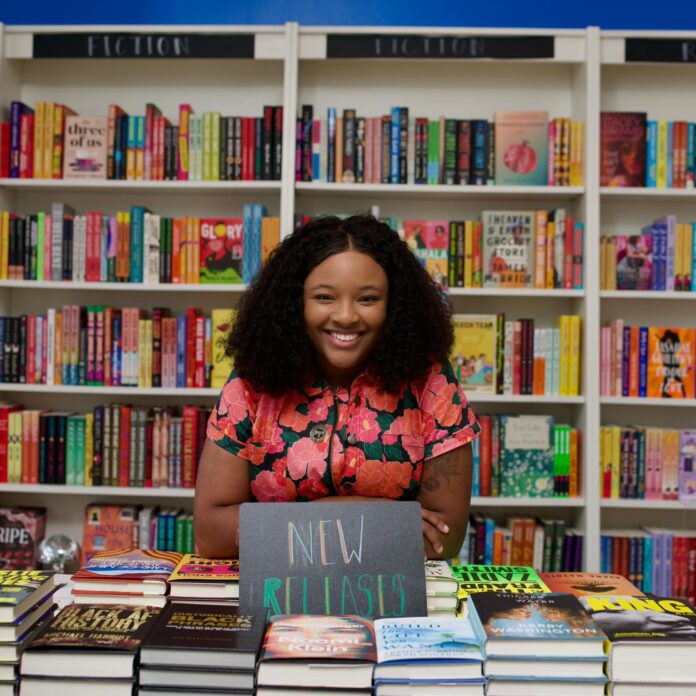
(CNN) — As a Black, queer woman, Leah Johnson always dreamed of being a storyteller.
“When you can see yourself in fiction, where you can see your experiences reflected back to you, it is an assertion that there is nothing wrong with you. You are not alone,” she said.
Johnson’s debut young adult novel, “You Should See Me in a Crown,” follows Liz Lighty, a Black teen who runs for prom queen to get a scholarship, only to fall in love with her classmate, Mack, who is also competing for the crown.
Time Magazine named the book one of the “100 Best YA Books of All Time” and in 2021 Johnson won an honorary Stonewall Book Award for young adult novels that reflect the LGBTQ experience.
And then came the book bans.
In 2022, the Oklahoma Attorney General’s office told local outlets it would review more than 50 school library books for alleged “obscene” material. Johnson’s novel was among the books challenged, according to a list obtained and published by The Frontier.
The state’s Attorney General’s office later walked back its investigation, but for Johnson, an author who primarily writes about people of color and the LGBTQ experience, the damage had been done.
This year, after her home state of Indiana passed a law that bans books deemed to be “obscene” or “harmful to minors” from school libraries, Johnson said she felt she had to act.
“I was raised very religious. And one of the things I learned growing up is that when the spirit calls, you gotta answer – and I felt called to open the bookstore,” she told CNN.
So, Johnson opened the doors to Loudmouth Books, a bookstore in Indianapolis dedicated to the books so often targeted by bans.
“Our principle of the store is that we highlight banned books and uplift marginalized authors,” she said. “And so, every book in the store is for, by or about marginalized people.”
A novel approach
Johnson said she was inspired to create the bookstore after her mom, Indiana state Rep. Renee Pack, campaigned against HB 1447, the state bill that would remove “material from the school library that is obscene … or harmful to minors.”
“I just thought if my mom can do it, if my mom can fight for me.
If my mom can speak my name in rooms, I’m not even in, then I should be showing up in those rooms myself. I should be affirming for myself that I deserve to be here just as much as anybody else,” Johnson said.
But despite objections from parents, students and fellow state lawmakers, in May, Indiana Governor Eric Holcomb signed HB 1447 into law.
Johnson said she was not surprised.
“It feels par for the course,” she said, adding that Indiana seems to be following states like Florida that have also moved to ban certain books.
According to a recent report by PEN America, a literary and free expression advocacy organization, book bans in public schools rose by 33% in the last academic school year.
Florida had the highest number of book bans – more than 1,400 – compared with any other state, according to the report. Texas, which had the most bans last year, had the second-highest number of book bans during the 2022-2023 school year, with 625 instances, CNN previously reported.
Johnson said representation in fiction novels is crucial and book bans can be especially harmful to students of color and those who are part of the LGBTQ community.
Books can help students learn “there are a lot of people out here who have been where you’ve been and have survived it and have thrived through it,” she said.
Since opening the store in September, Johnson said her novel, “Ellie Engle Saves Herself,” has quickly become a favorite among her customers. The novel follows Ellie, a young Black queer girl trying to navigate middle school with newly acquired superpowers.
“When we remove these books from the shelves, when these books are not able to be written for whatever reason … it’s the removal of queer people from public life,” she said.
“It’s a removal of discussions of racism, racialized bodies from public life. And if we don’t allow kids to have access to stories where they see themselves on the page, what are we teaching them? That who they are, is something to be ashamed of? Something to be scared of? That’s dangerous territory.”
Amid nationwide efforts to pass legislation to ban books from schools, some retailers have begun to include banned book sections in their stores and online. Communities have also rallied behind banned books and formed reading clubs.
Each year, the American Library Association hosts Banned Books Week, to help combat censorship and highlight the most challenged books.
Though her books have not been challenged as often as other authors, Johnson said she hopes her store will help keep their work visible and will elevate other authors who don’t have resources for their novels to be sold in retail stores.
“I know what it means to be somebody who moves through the world without ever seeing yourself reflected in the pages of a book. And I know the harm that that can cause,” Johnson said.
“But I also know that if I have a platform of any kind and I can use that platform to draw attention to the books that do disappear with no fanfare and their authors don’t have the means to fight it, then I should.”


